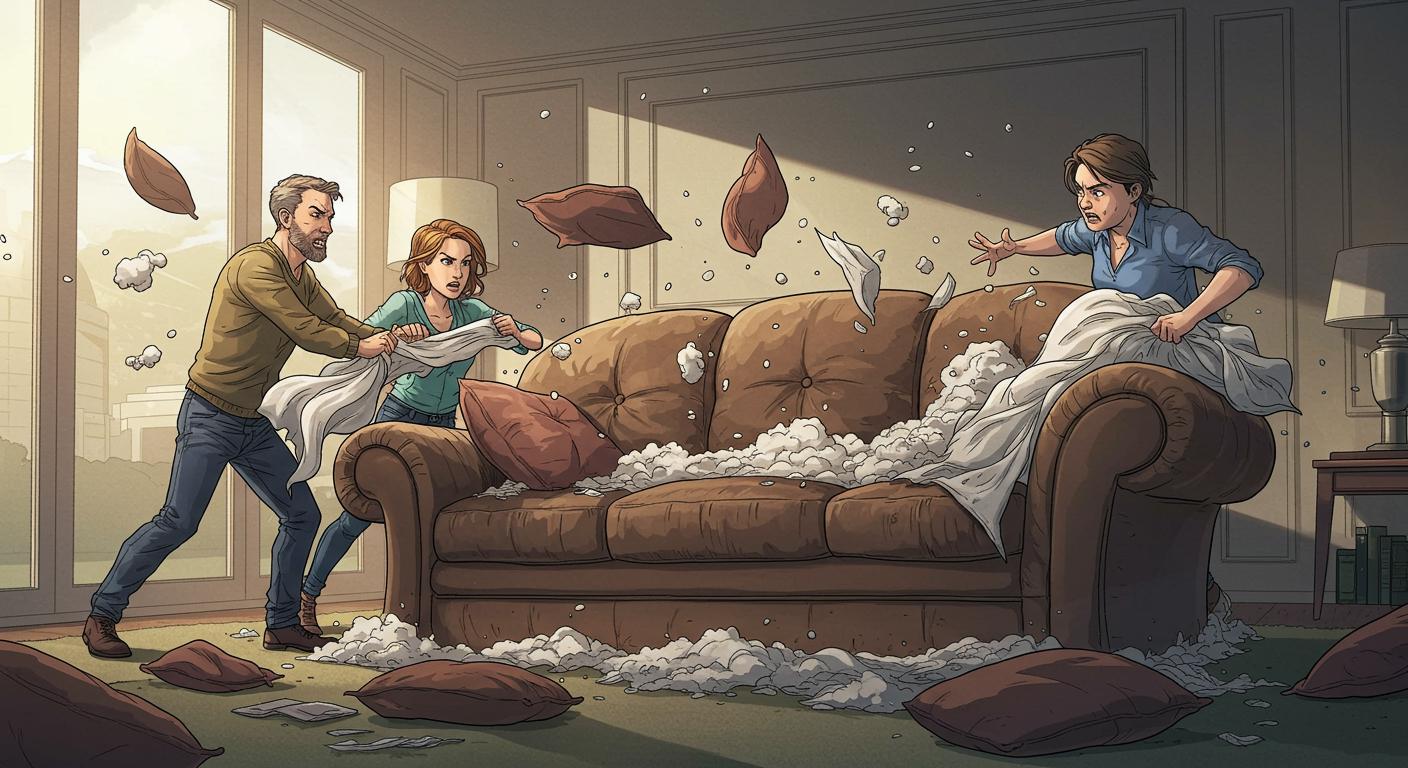If you ever wondered what separates a breezy afternoon on a pristine sofa from a cascading descent into household malaise, you haven’t encountered the saga of Donna and Thomas Dobko—now possibly the most famous couch-owners in British Columbia, thanks to an unexpectedly high-maintenance piece of furniture and a recent court ruling that reads like a masterclass in the art of “buyer’s remorse.”
Fluff vs. Foam: A Domestic Showdown
As described by CTV News, the Dobkos’ epic pillow pilgrimage began at a Muse & Merchant store in Coquitlam. The couple, intent on finding “solid and not floppy” living room furniture, purchased a couch and ottoman set, reportedly unaware they had opted for feather-filled cushions—well-known among furniture aficionados (and, apparently, furniture salespeople) for their tendency to sag and require frequent manual revival. After seven months and countless cushion compressions, the Dobkos returned to the store complaining their “Kalie” sofa deflated to a sad state after an hour or two of use.
Store management responded that feather-filled couches are intentionally crafted for a “shabby-chic” aesthetic, a look achieved with the help of regular fluffing. Yet, as CTV News documents, the crucial warning about high-maintenance “Feathersoft” cushions was tucked away inside a manufacturer’s warranty—a place even diligent buyers rarely consult before making a purchase. It’s a curious arrangement: how many of us are truly prepared to interrogate a sofa as if it were a used car before inviting it into our homes?
The Law on ‘Shabby-Chic’: When Shape-Shifting Furniture Becomes a Case
Judge Wilson Lee, relying on evidence summarized by CTV News, offered earnest consideration to the couple’s frustration over what could only be called unrelenting fluff fatigue. The Dobkos insisted they were never alerted—by sales staff or fine print—that their chosen sofa would demand ongoing squish management to avoid reverting to “floppy” form. At trial, Muse & Merchant staff demonstrated the proper fluffing technique and offered a retrofitting option: replacement with foam cores, for a considerable fee. The couple declined the offer, unconvinced they should pay more to avoid what felt like an unexpected furniture upkeep contract.
Much of the factual groundwork comes straight from the product’s warranty language. The report points out that the manufacturer’s documentation bluntly warns feather cushions require more attention, with the stuffing free to “shift,” and promises a “lived-in look”—interior design marketing that, as presented in the article, conveniently sidesteps the reality of drooping cushions by branding it as a lifestyle. Store management maintained the sofa was functioning exactly as intended, leaving only a disconnect between customer expectation and sofa reality.
Damages for Fluff Fatigue
All this led to a unique legal determination. Rather than granting the Dobkos the full refund they initially demanded, the judge awarded them $500 in damages—a recognition, as both the reporting and court decision emphasize, of the inconvenience and diminished “peace of mind” resulting from unwanted daily sofa maintenance. The judge based this on the finding that while the couch was not defective, there was, in effect, an implied agreement that the sofa would retain its shape for a reasonable period, which was not the couple’s experience. CTV News relays the judge’s observation that the Dobkos were not informed their sofa would need ongoing intervention, and that depriving them of the “peace of mind of not having to maintain the sofa” merited compensation.
Of note, the ruling clarifies, as detailed in the outlet’s coverage, that the Dobkos’ situation wasn’t the result of misrepresentation or bad faith. The salesperson was unaware of the manufacturer’s maintenance warning and merely failed to bridge the gap between expectation and warranty nuance. This small but illustrative legal remedy lands in the curious space between a genuine product flaw and the hazards of vague, feel-good marketing language.
Reflections on the Fine Print of Furniture
There’s something quietly fascinating in a case where existential discomfort is measured in the currency of squashed cushions rather than in millions of dollars or existential risk. The Dobkos’ journey through small claims court—requiring the legal dissection of a sofa’s tendency toward entropy—highlights how thoroughly everyday annoyances can be elevated to the status of civil wrongs. And according to CTV News, the court’s modest financial remedy affirms that persistent inconvenience, even over the most mundane of domestic matters, may occasionally warrant official recognition.
Does this mean the next frontier in consumer protection will be fought over the fine distinctions between “shabby-chic” and simply “shabby”? Or is it more likely to spark a few wary conversations at the furniture showroom, as prospective buyers now probe for hidden lifestyle requirements in their prospective purchases?
Ultimately, the Dobkos’ feud with their feather-stuffed furniture stands as a tribute to those overlooked, low-stakes battles that quietly shape our lives. It’s a reminder that no home is safe from entropy—and perhaps, somewhere, another unsung victim is mustering the resolve to take a stand against relentless cushion collapse.







